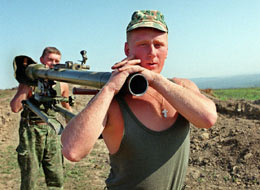Chechnya

The crisis moves west
This article was posted on October 8, 1999.
 Russian soldiers, fighting for control of Chechnya, carry a gun near Grozny on Oct. 8, 1999. (Source/AP) Related Links |
Two months after Islamic rebels sowed the seeds of violence in Dagestan, Russia has unleashed a whirlwind of destruction that has swept across the border into Chechnya. Since August, Russian-Chechen relations have further deteriorated as Russia has taken measures to regain control of the Caucasus.
In their most recent move, Russian forces have begun air strikes on the capital and have seized over a third of Chechen territory under the pretext of establishing a "security zone" and rooting out Islamic militants believed to be in Chechnya. With Russian troops within 12 miles of the capital, Chechen President Aslan Maskhadov has declared martial law and called on religious leaders to proclaim a holy war.
An Old Battle
Resisting foreign domination has deep roots in this part of the world. The Chechens, a distinct Muslim people with a unique language and culture, have survived attacks from numerous would-be conquerors in their 7,000-year history. Over the last 200 years, however, the gravest threat has been from Russia. Both Imperial and Communist Russia successfully annexed the Caucasus, and both met persistent Chechen resistance.
After the breakup of the USSR in 1991, Chechnya declared independence from Russia, only to be consumed by war three years later as Russia tried to regain control. The long and bloody war, which resulted in over 70,000 casualties, was finally brought to an end in 1996. But the terms of the peace were indecisive: the belligerents decided to defer a decision about Chechnya's formal status until 2001.
Chechnya considers itself independent. In 1997 it held internationally monitored democratic elections in which Maskhadov won the presidency, and changed the name of its capital from Grozny, a Russian name, to Djohar, a distinctly Chechen one. Despite Chechnya's de facto autonomy, the international community still considers the area Russian.
Russia Reasserts Itself
Although Russia has been operating under the pretext of fighting terrorists—it has blamed Chechen rebels for at least three recent bombings in Moscow—its ultimate goals carry far graver implications for independent-minded Chechnya. Since early September, Russian air strikes have systematically destroyed Chechen communications and infrastructure while ground troops pour in from the North indicating that Russia is reasserting its military and political authority in the region.
Meanwhile, the Chechen population is paying the price of Russia's reassertion: 125,000 Chechens have fled since Russian airstrikes began. This number will surely rise as Russia expands its ground operation. If the previous war is any indication, however, the Russians will not easily break Chechen resolve.
Escalating Events in Chechya
From early August to the beginning of October, events in Chechnya escalated with the events in Dagestan.
10 Aug.
Chechen President Maskhadov denies Chechen involvement with the militants.
11 Aug.
Chechen government refuses Russian request to send troops to Dagestan.
15 Aug.
Maskhadov declares state of emergency in Chechnya.
16 Aug.
Chechnya mobilizes troops, reservists and veterans of the 1994-96 war with Russia.
25 Aug.
Chechnya reports that Russia staged two air strikes against Chechnya and warns that Russia may be resuming hostilities towards Chechnya.
Russian Defense Minister Sergeyev denies the attacks, but the spokesman in Dagestan confirms them.
3 Sept.
Chechen Vice President Vakha Arsanov states Chechnya supports peaceful settlement of the situation.
4 Sept.
Maskhadov calls for international recognition of Chechnya and accuses Russia of supporting criminal gangs in Chechnya.
5 Sept.
Militants invade Dagestan again from Chechnya. Russia bombs suspected militant bases in Chechnya.
9 Sept.
Chechen Security Council meets. Chechen government reports more attacks against villages in Chechnya.
11 Sept.
Russia denies Chechen claims that they targeted Chechen villages.
13 Sept.
Maskhadov calls Russian strikes against suspected militant bases an act of aggression.
15 Sept.
Russian Prime Minister Vladimir Putin accuses Chechnya of harboring militants and terrorists responsible for Moscow bombings.
16 Sept.
Militants gather on Chechen border with Dagestan. Over 15,000 gather in Djohar to protest Russian military operations in the Caucasus.
17 Sept.
Chechnya asks international community to halt Russian aggression.
23 Sept.
Russia bombs radar at Djohar airport. Sergeyev vows to implement security zone around Chechnya, a veritable cordon sanitaire.
24 Sept.
Russia bombs oil facility in Djohar.
27 Sept.
Russia reports that it is considering a ground operation in Chechnya and intensifies its air campaign, hitting oil facilities, a television tower, a cellular phone network and the Djohar airport.
29 Sept.
Federal Troops amass on Dagestani border with Chechnya. Putin vows to destroy all terrorists in Chechnya.
Russian Foreign Minister Ivanov says that Russia is ready to begin a political dialogue with Chechnya if the Chechen government agrees to extradite the terrorists.
30 Sept.
Putin confirms that as of today, ground operations are in motion in Chechnya.
1 Oct.
Maskhadov asks Georgian President Shevardnadze to act as negotiator between Russia and Chechnya but the Russian General Staff refuses to negotiate.
4 Oct.
Sergeyev says that Russia will gradually widen the "security zone" in Chechnya.
5 Oct.
Russian forces occupy one third of Chechen territory and come within 12 miles of Djohar.
